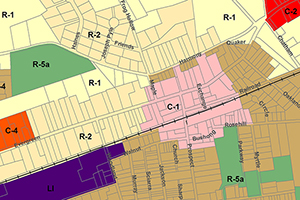Planning in Pennsylvania
First, and foremost, it is important that you become familiar with the rules that guide planning in your municipality. State enabling legislation has been passed that governs planning in Pennsylvania. It guides how local planning commissions operate, as well as the plans and ordinances that are developed to implement the plan.
The legislation is known as the Pennsylvania Municipalities Planning Code, Act 247. This legislation goes by several names, including the MPC, Act 247 and the Planning Code. You can download the most recent version of the MPC through this webpage.
Key articles within the Planning Code to become familiar with include:
- Article 2: Planning Agencies
- Article 3: Comprehensive Plan
- Article 5: Subdivision and Land Development
- Article 6: Zoning
Having a general understanding of the Municipalities Planning Code can go a long way to assisting you in performing your duties as a planning commissioner. All planning commission members are encouraged to obtain a copy and keep it with them during all meetings of the planning commission.
Planning Agencies
 Article 2 of the Planning Code establishes the rules for creating a planning commission and how they will function. The governing body, consisting of either the board of supervisors, borough council or board of commissioners, is provided the power to establish a planning commission. The planning commission serves on their behalf. It should be noted that not all municipalities in Pennsylvania have planning commissions.
Article 2 of the Planning Code establishes the rules for creating a planning commission and how they will function. The governing body, consisting of either the board of supervisors, borough council or board of commissioners, is provided the power to establish a planning commission. The planning commission serves on their behalf. It should be noted that not all municipalities in Pennsylvania have planning commissions.
The Article defines the core aspects of the planning commission:
- Appointments to the planning commission
- Terms of office
- Powers and duties of the commissioner
Terms are for four years and are staggered so that there is continuity on the commission by avoiding significant turn over from year to year. Planning commissions can have a wide range of responsibilities, but the core function is to prepare and monitor the municipal comprehensive plan.
Comprehensive Plan
 Article 3 of the Planning Code governs the comprehensive plan. A comprehensive plan is the long-range policy plan for your municipality. The plan contains maps, charts and text to document trends and issues, and make recommendations for how to guide the future of your municipality. It establishes goals and objectives as well as strategies for implementing these values in a variety of areas; including but not limited to:
Article 3 of the Planning Code governs the comprehensive plan. A comprehensive plan is the long-range policy plan for your municipality. The plan contains maps, charts and text to document trends and issues, and make recommendations for how to guide the future of your municipality. It establishes goals and objectives as well as strategies for implementing these values in a variety of areas; including but not limited to:
- Land Use
- Housing
- Transportation
- Community Facilities and Services
- Natural and Historic Resources
- Water Supply
- Energy Conservation
Once adopted by the governing body, it serves as a guide for public decision making as well as the preparation of regulations within your community. The planning commission is responsible for drafting the comprehensive plan.
All 73 Chester County municipalities, including the county itself, have adopted a comprehensive plan. The county's comprehensive plan is entitled Landscapes3. The county strives to maintain consistency between local municipal plans and the county plan through developing partnerships with municipalities and coordinating planning policies.
Subdivision & Land Development
 Article 5 of the Planning Code governs the creation and administration of a subdivision and land development ordinance. A subdivision and land development ordinance is a regulatory tool that helps implement the comprehensive plan. The ordinance governs the process of subdividing land into parcels. It contains the following items:
Article 5 of the Planning Code governs the creation and administration of a subdivision and land development ordinance. A subdivision and land development ordinance is a regulatory tool that helps implement the comprehensive plan. The ordinance governs the process of subdividing land into parcels. It contains the following items:
- Regulations for plan submission and processing.
- Standards for public improvements including, but not limited to streets, paths, sewer and water service, stormwater management and other utilities.
- Standards for the dedication of these improvements.
Much of the activity of municipal planning commissions centers on the review of subdivision and land development applications. Applications should be reviewed not only for compliance with ordinances but also consistency with the municipal comprehensive plan. The planning commission is typically provided with professional assistance from the municipal engineer and solicitor serving the municipality, and often from a land planning consultant.
All Chester County municipalities have adopted a subdivision and land development ordinance.
Zoning
 Article 6 of the Planning Code governs the creation and implementation of a municipal zoning ordinance. A zoning ordinance is a regulatory tool that helps implement the comprehensive plan. The ordinance governs such things as:
Article 6 of the Planning Code governs the creation and implementation of a municipal zoning ordinance. A zoning ordinance is a regulatory tool that helps implement the comprehensive plan. The ordinance governs such things as:
- The use of land.
- The density which development can take place, including minimum lot size, building setback provisions, and yard sizes.
- Maximum building and lot coverage standards.
- The process for obtaining zoning permits and administering the ordinance.
- The protection of agricultural, natural and historic resources.
The ordinance consists of text and a zoning map. Once zoning is adopted by the governing body, all lands within your municipality must be assigned to a zoning district. Uses can be assigned to one of three categories in each zoning district:
- By right — uses permitted by the zoning officer provided standards are met.
- By conditional use — uses permitted by the governing body after public hearing following a defined process in the ordinance.
- By special exception — uses permitted by the zoning hearing board, after public hearing following a defined process in the ordinance.
All Chester County municipalities have adopted a zoning ordinance.


